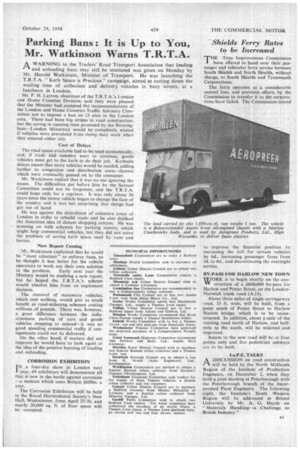Parking Bans : It is Up to You, Mr. Watkinson Warns T.R.T.A.
Page 35

If you've noticed an error in this article please click here to report it so we can fix it.
A WARNING to the Traders' Road Transport Association that loading 1-1 and unloading bans may still be instituted was given on Monday by Mr. Harold Watkinson, Minister of Transport. He was launching the T.R.T.A. "Kerb Space is Precious" campaign, aimed at cutting down the waiting time of collection and delivery vehicles in busy streets, at a luncheon in London.
Mr. F. H. Layton, chairman of the T.R.T.A.'s London and Home Counties Division, said they were pleased that the Minister had accepted the recommendations of the London and Horne Counties Traffic Advisory Committee not to impose a ban on 23 sites in the London area. There had been big -strides in road construction, but the saving in running time promised by the Birmingham—London Motorway would be completely wasted if vehicles were prevented from doing their work when they entered either city.
Cost of Delays The road space available had to be used economically, and, if trade and industry were to continue, goods vehicles must get to the kerb to do their job. Kerbside delays meant that more vehicles would be needed, adding further to. congestion and distribution costs—factors which were eventually passed on to the consumer.
Mr. Watkinson replied that it was no use ignoring the issues. The difficulties put before him by the Samuel Committee could not be forgotten, and the T.R.T.A. could hope only for a reprieve. It was only about 50 years since the motor vehicle began to change the face of the country and it was not surprising that things had got out of hand.
He was against the demolition of extensive areas of London in order to rebuild roads and he also disliked the American idea of distant shopping centres. He was pressing on with schemes for parking meters. which might help commercial vehicles, but they did not solve the problem of saving kerb space used by vans and lorries.
New Report Coming Mr. Watkinson explained that he would be "most reluctant" to enforce bans, so he thought it was better for the vehicle operators to work out their own solution to the problem. Early next year the Ministry would be studying a new report, but he hoped the T.R.T.A.'s scheme would absolve him from an unpleasant decision.
The removal of stationary vehicles, which cost nothing, would give as much benefit as road-widening schemes costing millions_of pounds. There was, however, a great difference between the indiscriminate parking of cars and goods vehicles stopping to unload—it was no good speeding commercial traffic if consignments could not be delivered.
On the other hand, if matters did not improve he would have to look again at the idea of the positive banning of loading and unloading.
CORROSION EXHIBITION
IN a four-day show in London next 1 year, 69 exhibitors will demonstrate all that is new in the battle against corrosion —a menace Which costs Britain £600m. year.
The Corrosion Exhibition will be held in the Royal Horticultural Society's New Hall, Westminster, from April 27-30, and nearly 20,000 sq. ft. of floor space will be occupied.




































































































